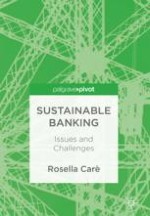2018 | OriginalPaper | Buchkapitel
5. Sustainability in Banks: Emerging Trends
verfasst von : Rosella Carè
Erschienen in: Sustainable Banking
Aktivieren Sie unsere intelligente Suche, um passende Fachinhalte oder Patente zu finden.
Wählen Sie Textabschnitte aus um mit Künstlicher Intelligenz passenden Patente zu finden. powered by
Markieren Sie Textabschnitte, um KI-gestützt weitere passende Inhalte zu finden. powered by
